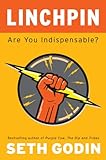Seth Godin, from Linchpin: Are You Indispensable?:
The single biggest objection to changing the way you approach your job is the certainty that your boss won’t let you do anything but be a cog.
Nine times out of ten, this isn’t true. One time out of ten, you should get a new job.
Let’s take the rare case first.
If you actually work for an organization that insists you be mediocre, that enforces conformity in all its employees, why stay? What are you building?
The work can’t possibly be enjoyable or challenging, your skills aren’t increasing, and your value in the marketplace decreases each day you stay there. And if history is any guide, your job there isn’t as stable as you think, because average companies making average products for average people are under huge strain.
Sure, it might be comfortable, and yes, you’ve been brainwashed into believing that this is what you’re supposed to do, but no, it’s not what you deserve.
The other case, though, is the common one. You think your boss won’t let you, at the very same moment that your boss can’t understand why you won’t contribute more insight or enthusiasm. In most non-cog jobs, the boss’s biggest lament is that her people won’t step up and bring their authentic selves to work.
